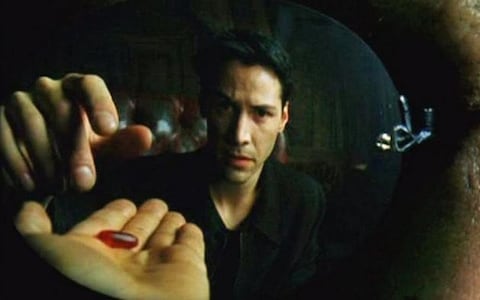Salvador
RF's Swedenborgian
That's not ALL we are, because programmed machines are not sentient. But I believe our actions are all predestined, yes.
By God.
You were predestined to ask.
A "machine" is any causal physical system, hence we are machines; thus, machines can be conscious. The question is: What type of machines could be conscious? Odds are robots passing the Turing Test Turing test - Wikipedia would be indistinguishable from us in their behavioral capacities --and could be conscious (i.e. feel), but we can never be certain. There's no way for any "conscious" being to know whether or not he is actually experiencing a virtual reality produced by an interface between his brain and a computer .
I don't know much about God, besides the fact of this extraterrestrial intelligence having left its mark in our genetic coding. After our shared cosmic ancestor having invented and delivered the genetic code of life to Earth, I have no idea how much of my behavior is genetically programmed and how much of my behavior is in response to the environment on Earth where I live. I believe many people can choose the environment where they live, and each person's environment is formed mostly by nature, but I've realized there's a significant chance nobody around me exists in a base reality.
There are indeed some possible indications we are living in a computer simulation....
1. A particle passing through a double-slit behaves as a wave causing an interference pattern when unobserved, but this same particle doesn't create an interference pattern when its path of travel can be determined by an observer. This collapse of the wave-function could be happening in order to save computational resources necessary for our simulated reality.
2. There is indeed a mark of intelligence left in our genetic code as evident by how the numeric and semantic message of 037 appears in our genetic code. Each codon relates to 3 other particular codons having the same particular type of initial nucleobase and sequential nucleobase subsequently then followed by a different ending nucleobase. Half of these 4 set of codon groups ( whole family codons ) each code for the same particular amino acid. The other half of those 4 set of codon groups ( split codons ) don't code for the same amino acid. So then, in the case of whole family codons, there are 37 amino acid peptide chain nucleons for each relevant nucleobase determinant of how a particular amino acid gets coded. Start codons express 0 at the beginning of 37 Hence, the meaningful numeric and semantic message of 037 gets unambiguously and factually conveyed to us descendants of our cosmic ancestor(s) with our genetic code invented by a superior intelligence beyond that of anybody presently bound to Earth.
This mark of intelligence left in our genetic coding is indicative of an intelligent designer, who may be responsible for the simulation of our reality.
3. Theoretical physicist Dr. S. James Gates Jr. has revealved that a certain string theory, super-symmetrical equations describing the nature and reality of our universe, contains embedded computer codes; these codes have digital data in the form of 0's and 1's identical to what makes web browsers function, and they're error-correct codes.
At least one of the following statements is very likely to be true:
1. Human civilization or a comparable civilization is unlikely to reach a level of technological maturity capable of producing simulated realities or such simulations are physically impossible to construct.
2. A comparable civilization reaching aforementioned technological status will likely not produce a significant number of simulated realities (one that might push the probable existence of digital entities beyond the probable number of "real" entities in a Universe) for any of a number of reasons, such as diversion of computational processing power for other tasks, ethical considerations of holding entities captive in simulated realities, etc.
3. Any entities with our general set of experiences are almost certainly living in a simulation.
4. We are living in a reality in which posthumans have not developed yet and we are actually living in reality
"Bostrom's argument rests on the premise that given sufficiently advanced technology, it is possible to represent the populated surface of the Earth without recourse to digital physics; that the qualia experienced by a simulated consciousness are comparable or equivalent to those of a naturally occurring human consciousness, and that one or more levels of simulation within simulations would be feasible given only a modest expenditure of computational resources in the real world."
ARE YOU LIVING IN A COMPUTER SIMULATION? BY NICK BOSTROM
Faculty of Philosophy, Oxford University
Published in Philosophical Quarterly (2003) Vol. 53, No. 211, pp. 243-255.
Are You Living in a Simulation?
I choose or was predestined to take the red pill knowing there is no turning back. I didn't take the blue pill, because I didn't want the story to end, then waking up in bed and simply believing whatever I want to believe. I took the red pill for staying in Wonderland and getting shown how deep the rabbit-hole goes.

After taking the red pill, I watched the below video about possible indications we're living in a simulated reality.
Last edited:
